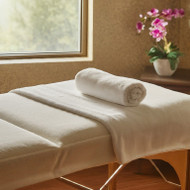How Massage Therapy Can Aid Trauma Recovery
Posted by Jay Suthers on Mar 8th, 2024
The Healing Touch: How Massage Therapy Can Aid Trauma Recovery
Psychological trauma can leave lasting scars, not just on the mind, but on the body as well. Chronic muscle tension, headaches, and sleep disturbances are all common after experiencing a traumatic event. Massage therapy, often seen as a relaxation technique, can be a powerful tool in a trauma survivor's healing journey.
How Trauma Affects the Body
Trauma triggers the body's fight-or-flight response, flooding it with stress hormones like cortisol. This can lead to muscle tension, headaches, and digestive issues. Over time, these physical symptoms can become chronic, contributing to anxiety, depression, and difficulty sleeping – all of which can worsen the effects of trauma.
Massage Therapy's Role in Healing
Massage therapy works in several ways to help trauma survivors find relief. Here are some key benefits:
- Reduced Stress and Anxiety: Massage therapy lowers cortisol levels and promotes the production of feel-good hormones like serotonin and dopamine. This can lead to a decrease in anxiety and feelings of overwhelm.
- Muscle Relaxation: Trauma can cause chronic muscle tension. Massage techniques like Swedish massage and trigger point therapy can help to release this tension, improving flexibility and reducing pain.
- Improved Sleep: Massage therapy can promote relaxation and deeper sleep, which is crucial for trauma recovery. Better sleep allows the body and mind to rest and repair.
- Body Awareness and Control: Trauma can lead to a feeling of disconnection from the body. Massage therapy can help individuals reconnect with their bodies in a safe and positive way.
- Reduced Pain: Chronic pain is a common symptom of trauma. Massage therapy can help to manage pain, improving overall well-being and quality of life.
Creating a Safe Space
It's important to note that massage therapy should be approached with caution for trauma survivors. A qualified massage therapist who specializes in trauma-informed care will create a safe and supportive environment. This includes open communication, allowing the client to control the pace and pressure of the massage, and respecting boundaries.
Massage Therapy: A Complementary Approach
Massage therapy is not a replacement for trauma-focused therapy, but it can be a valuable complementary treatment. When used in conjunction with therapy and other healing modalities, massage therapy can be a powerful tool for promoting physical and emotional well-being on the path to recovery.
Seeking Help
If you are a trauma survivor and are interested in exploring massage therapy, it's important to find a qualified therapist who understands the specific needs of trauma survivors. Look for someone who has training in trauma-informed care and who prioritizes creating a safe and comfortable space for healing.
I was unable to find a massage therapist directory that specifically lists massage therapists with this specialty. Click on this GOOGLE SEARCH and then allow Google to know your location. Google will suggest massage therapists near you that specialize in trauma recovery.
Shop for Massage Products Here.
I hope this article is helpful but please let me know if you have any questions or thoughts.
Sincerely Yours, Jay
If you would like to comment on this blog or have any questions, please feel free to Contact Sage Meditation Customer Service.

